#The Machina
Text
Spiral Empire - The Machina
The second of the two human factions in my original novel, tentatively called “The Spiral Empire”
It will probably help to read the prologue first, and probably my post on the protagonist species, the Chie
The Machina came about when I asked the question, what would the Borg be like if they were able to maintain their individuality, while still being part of a collective? The concept took on a life of its own from there, and neatly slotted into the Spiral Empire universe when I realized that a third “nation” would be useful from a narrative standpoint.
Origins
Another of the colony ships that survived the plunge through the Planet Nine wormhole found itself in a young solar system, with a hot, young sun only a few million years old. Unfortunately for them, this meant the ship was stranded in system with no planets yet, only planetesimals – chunks of matter that are yet to condense into planets. Think of it as like a solar system-wide asteroid belt. What the survivors had was a mostly functioning colony ship, still with enough resources to keep its crew and the passengers in cryo-sleep alive for the next 50 years or so, lots of metals, silicates, ices (including water ice), and other basic resources available if they could figure out a way to harvest them, and abundant solar energy. What they did not have was a planet on which to settle, and with the de-stabilization of the wormhole that spat them out, no way out of this solar system, other than taking the “long way”. That would be, finding a suitable target star within 4 light years, hoping there was a livable planet *there*, and setting out again.
The crew decided to awaken some experts from among the passengers. One of these experts was a roboticist and cyberneticist, Doctor Mary Calvin, who was awoken initially in order to build robots in order to help harvest asteroids. However, she came up with an ingenious, if extreme-sounding solution to maximize the efficiency of food, water, air, and other resources required to keep organic life alive: replace unessential living tissue with robotic limbs and implants. After all, a robotic leg you could “plug in” to use solar electricity directly is a more efficient use of energy than continuing to feed said leg.
(Mary’s name is derived from two famous women in science fiction, Mary Shelley, the author of “Frankenstein”, and Susan Calvin, the roboticst from Issac Asimov’s Robots stories)
Robotic replacements have other advantages too, like alleviating many of the health concerns that come with prolonged exposure to the zero-gravity environments the colonists found themselves in. A cybernetic heart wouldn’t degrade like an organic one. Calcium-leeched bones could be reinforced by metals. A robotic leg that ended in a more flexible, hand-like “foot” would be infinitely more useful that a flat, human foot that did little more than drag behind you.
As the first of the colonists’ new environments were hollowed out from, then built from, the larger planetisimals and more and more people were gradually awoken from cryo-sleep, Dr. Calvin’s advancements were adapted by more and more people. After about 200 years, almost every adult member of their society has been augmented to one degree or another, ranging from a simple foot replacement, to almost full-body cybernetics. “Human” was no longer an adequate term, so the people chose another – the Machina. (pronounced Ma-kee-na)
With their cybernetics solving a lot of the health problems imposed on the human body by zero-gravity, the Machina don’t even bother to spin most of their habitats for centrifugal force “gravity”. While their ship served as their first “home”, it wasn’t long before they hollowed out one of the larger planetesimals to serve as their first, purpose-designed habitat. They called it “Home One” (unless Disney gets bitchy about an obscure Star Wars reference), and subsequent habitats expanded out from there, though most are capable of independent movement, able to hide among the billions of planetesimals.
The Machina – Humanity +
Because space and time are actually aspects of the same phenomenon, as explained (a lot better than I can explain it!) in Albert Einstein’s Theory of Special Relativity, wormholes connect not just different spots in space, but in time as well. So while it’s been 500 years since leaving Earth for the Chie, it’s been only about 200 for the Machina (and 1000 for the Confederacy). There are actually some elderly Machina still alive who remember Earth. Despite the harshness of their solar system, however, most do not miss it.
Each Machina’s cybernetic implants are unique to the individual, with varying degrees of replacement depending upon a large number of factors, including their careers, personal preference, interests, etc. Almost all Machina have the following, however:
1. Implants directly in the brain, connecting each Machina to a solar system-wide internet. They also have at least one eye either replaced entirely with an implant, or equipped with an external “screen” that goes over the eye to facilitate access to the Net. Imputing commands or communication in the Net is second nature to Machina, and while in their own solar system, they spend nearly their entire waking lives “online”. However, this Net is not a hive mind. Each Machina is an individual, with their own choices, thoughts and ideas, and they are free to “go offline” whenever they choose (barring employment-related safety concerns, of course).
2. At the very least, organic feet are replaced with robotic substitutes that have the ability to either lay flat, like a normal foot, or stretch out in a hand-like configuration, acting as extra hands while in zero-g, or whenever they feel like it. Consequently, shoes are a thing of the past for Machina. Since only young children have their organic feet, Machina tend to see “normal” human feet as cute and/or childish. “Awww, they still have their baby feet!” is a phrase often used to annoy Chie and Confederates alike.
Many, however, go for full limb, or even majority body upgrades, and these aren’t necessarily humanoid in shape.
Many Machina have very redundant digestive systems – often just what is needed to keep the brain and necessary support organs (heart, lungs, circulatory system) alive, so they prefer soft, easily absorbed “food”, kind of like how Robocop lived on baby food.
Because of the flexibility their physical bodies can have, most Machina (outside of one significant group, which will be discussed in detail) think notions of gender are outdated. Many are nonbinary and bisexual, and often prefer they/them pronouns unless they say otherwise. Before getting their adult cybernetics, however, most do store their reproductive cells, be they eggs or sperm, for later use.
The Matrons
As flexible as cybernetics have made Machina life, there is one limitation imposed by human biology. Studies on the International Space Station in real life involving rats have suggested that mammals need gravity for embryos to successfully develop. For the Machina, this means that zero-g makes for an effective birth control, for those who even still have the parts required to worry about pregnancy in the first place. Population growth *has* to be carefully controlled when your entire population lives in space habitats regardless, but children still need to be born.
There were a few experiments early on with “uterine replicators” but all ended in failure. Unlike lower mammals, for reasons still poorly understood even at the Machina’s far greater scientific level than our present-day society, human pregnancies need to be carried by an actual, biological mother to be successful, at least until the point where the fetus can survive on its own outside the body (around 23 weeks pregnant at current technological levels, perhaps a bit earlier at the Machina’s levels). Regardless, it’s generally far healthier for the children’s physical and psychological development to develop for as close to full term as possible.
A special profession has thus developed in Machina society for the women who volunteer to forego extensive cybernetics in order to retain their ability to become pregnant, acting as surrogates for those who cannot, and who usually train as midwives, obstetricians, and neonatologists.
They are the Matrons, and they are perhaps THE most highly respected people in Machina society. Even the Deus Ex, the leader of their people, takes pause when a Matron speaks, as they are the ones literally keeping their society alive.
To be a Matron is not an easy calling. It requires a strong physical body, an intelligent mind, and greater biological resources than those used by most adult Machina. They’re also mostly confined to the few space stations that the Machina bother to spin for artificial gravity. They’re among the nicest habitats in the Machina solar system, but for a people that greatly values the freedom their literally space-farring society is used to, the stations can feel stiffening. They also begin their careers far earlier than most Machina, who tend to enjoy extended educational years well into their twenties. Novice Matrons, in contrast, usually have their first pregnancy at between 16/17, and have one every two years (give or take) until menopause. All the while, most also train to be medical doctors.
More experienced Matrons (late 20s/early 30s) may even volunteer for alternating single and multiple pregnancies (usually no more than “twins”, though genetically unrelated).
There are some perks to the profession, like a Matron enjoys real food, gets to live most of her life in gravity and among plants (the stations where they live usually double as agricultural stations as well), and unlike the “baby lottery” most other Machina families who want children sign up for, is guaranteed the right to have a child of her own should she desire one (and most do).
Retired Matrons are known as Matriarchs, and usually continue to support their younger compatriots as doctors, mentors and caregivers well into their elder years. Matrons who need to “retire” early from the pregnancy part of the profession for health reasons can either stay in the profession as healthcare providers only, or can retrain for another. One such former Matron, known as Dee, became the Communications Officer and First Mate aboard the Spiral Empire Explorer ship, the RRS Beagle.
While the genetic parents of the children take over their care after birth, Matrons often stay in touch with those families, becoming like a beloved Aunt to the children they once carried. Considering young children usually stay on the same space stations their Matrons live on during their baby and toddler years, it’s usually easy to stay in touch. Some Matrons may alternatively work as Early Years teachers instead of doctors, caring for the children they, or their collegues, gave birth to while their parents work at other professions. It’s a right of passage for a Machina child’s Matron, as well as their parents, to be present they get their first set of cybernetic feet. Losing their “Baby Feet” is a celebrated moment in Machina life.
(I created the Matrons as not only a practical solution for a major problem that a space-farring society would have, but also as a response to dystopia sci fi where women are abused and enslaved for their reproductive abilities. Isn’t it better to imagine a world where motherhood is respected and honoured, while *not* demonizing those who choose to not have children? As it should be in real life.)
Machina Culture and Government
Machina seem a bit contradictory in that they do value individual choice very highly, but at the same time, they realize the need to work together to ensure their survival. Their mindset is usually along the lines of "if it doesn't hurt others, it's okay", but they have no tolerance for actions that do cause harm.
With their relatively small population (still only a few million by the time of the present day of the novel), they simply can’t afford to tolerate racism, sexism, homophobia, transphobia, ableism, ageism or any other idiocies that frankly, are completely useless and take energy away from far more pressing issues, like ensuring their stations don’t leak atmosphere out into space. Luckily, due to the tolerant and information-based nature of their society, such ills aren’t really more than chapters in history textbooks for them.
Hoarding necessary resources is likewise severely frowned upon. There are no Machina companies or people laying sole claim to needed asteroids. It’s understood that the resources belong to the people and will be used for the people’s benefit.
Likewise, outright laziness is also not tolerated. Everyone needs to contribute to society in some way. If an otherwise healthy adult is not contributing, they’re assessed to figure out what the problem is and supported. But if someone just outright refuses to better themselves, well, it’s harsh, but they’ll probably end up having a little accident involving an airlock.
Again, this is so rare that it’s more a textbook “what if” scenario than something that actually happens.
Spreading false information/conspiracy theories/harmful ideologies is likewise severely frowned upon. If those lies are proven to have hurt another, the punishment for the perpetrators is to be cut off from the society-wide internet, temporarily for a first offence, permanently for more serious occurrences. Persistent, unapologetic perpetrators are also likely to meet the outside of an airlock.
Due to their cranial computers and the “almost always online” nature of their society, the Machina have a luxury that no other human society has been able to achieve: they have complete direct democracy for their governing system.
Every adult individual has the ability and means to vote on any issue, and an 80% consensus must be reached for a new law, for example, to be passed.
When a new law is being discussed, a "pop up" is sent to every person online, with information on the issue. The Machina then has a few days to research and decide, or they can "click" "abstain". Still, since they know an issue will keep popping up until that 80% of the population consensus is reached, one way or the other, most do give issues their attention.
Likewise, any Machina can bring up a concern in a public forum.
They therefore have a very politically active and well-informed population.
The Machina’s “leader” is more of a referee, whose job it is to manage the flow of information and ensure the will of the people is followed. They’re also their culture’s most prominent representative to outsiders (so they’re responsible for relations between the Machina, and the Chie and Confederacy). They’re given the title “Deus Ex” (from the expression “deux ex machina”, a Latin term for “ghost” or “god in the machine”, meaning a plot device whereby a seemingly unsolvable problem in a story is suddenly and abruptly resolved by an unexpected and unlikely occurrence. They chose the title purely because of the pun.
Deus Ex serve until they are either voted out by the populace or they retire from the position.
There are no set terms. A Deus Ex who has only been in office for a month can be gotten rid of if they’re deemed incompetent. Likewise, one that’s good at their job can stay there for decades.
The current Deus Ex has been in office long enough to have been a guest at the Spiral Empress Xelarra’s coronation. His spine, neck and head are the only human parts left of him (similar to the Borg Queen in Star Trek: First Contact), and he can “plug in” to different robotic bodies, his favourite being a “spider centaur” look. He is an expert diplomat, and has quite the crush on the Spiral Empress, having great admiration for her intelligence and tenacity. He’s terrified of her husband though, refusing to believe the Chie Grand Admiral is dead (“unless I see his cold, dead corpse at my feet, he’s still out there!”)
Machina Relationships with the other Factions
As I described in my post on the Chie, the Machina and Chie get along pretty well. Both have similar “we’re all on the same ship” mentalities, and Chie tend to think the Machina’s cybernetics are awesome. There’s quite a bit of overlap and cooperation between the two cultures.
The Deus Ex himself would not be adverse to a “personal union” between the Machina and Spiral Empire (more specifically, between himself and the Empress), but knows this is (regrettably) just wishful thinking on his part. He greatly values Empress Xelarra’s friendship regardless.
While the Machina don’t have the resources to fund an Explorer program themselves, they support their Chie allies with personnel and technology (the Explorer ships’ advanced sensor systems are of Machina design). Currently, both the Chie and the Machina’s systems’ wormholes exit into Confederacy-controlled space. If they want to maintain contact with each other, they have no choice but to play nice with the Confederacy.
The Machina have little contact with the Spiral Empire’s alien allies (the Dragons and the Tripods) just yet.
When it comes to the Confederacy, the Machina are far more hostile, and with good reason. The Confederacy once tried to take over the Machina solar system by force, as a part of the Confederacy’s belief in their “manifest destiny” to reunite humanity (under their own banner, of course), despite the fact they barely consider the Machina human. The Deus Ex at the time (the direct predecessor of the current one) was able to scare them off by destroying the Confederate flagship with an asteroid defense laser. The battle resulted in the laser’s destruction as well, and damage to Home One, but the Confederacy got the hint and left.
After that, the Machina engaged in cautious trade with the Confederacy, if only to maintain access to the other side of the wormhole. They overcharge them for an asteroid’s worth of metal, for example, in return for “luxury” planetside goods they otherwise wouldn’t have access to. However, the Machina are wise enough to ensure they do not become dependent upon trade, from either their would-be enemies or their friends, carefully managing their population to make sure they can always support themselves.
As a result of the skirmish with the Confederates, the current Deus Ex formed a small, special forces group to protect his people. They are the Four Lions, and report directly to him, with the aim to preventing both outside and inside threats to the Machina people as a whole before they become big problems. They’re known by the code names “The Samurai”, “The Ninja”, “The Soldier”, and “The Cyborg”. (my husband’s OCs. I’ll develop them more as necessary).
There used to be a Fifth Lion, just called the Destroyer (originally we called him “The Dalek” due to his violent, “exterminate everything” attitude. That's obviously going to have to be changed) who's function was simply to destroy indiscriminately, and who was insanely hateful of the entire universe. He proved just too dangerous, so the Deus Ex had his cybernetics removed. Now he's just a brain in a jar, who the Deus Ex hopes he'll never have to use again.
Knowledge of the Lions wasn’t well-known to begin with, even with the system-wide internet and the general openness of Machina society, there are still some secrets. Records were scrubbed of the fifth one, with any rumours of his existence being later dismissed as an example of the Mandela Effect by most of the populace.
If the Chie ever succeed in finding an alternate wormhole to Machina space, they’ll seriously consider simply cutting off access to the current route, for their own safely and independence as a society.
Notable Machina (few right now. This list will probably grow as I get more into the story)
Dr. Mary Calvin - the original colonist and roboticist who invented the first cybernetics widely adopted by the people of the Machina solar system. Later considered the first Deus EX.
- Named after Mary Shelly and Dr. Susan Calvin, as noted above.
The Previous Deus Ex - Defended his people against a Confederate invasion by “firing my laser!”
The Deus Ex - Current “leader” (more mediator) of the Machina.
- Inspired by Grand Admiral Osvald Teshik, the cyborg Grand Admiral who was tragically murdered by the Rebels after the Battle of Endor in Star Wars: Legends, with further inspiration from the post Episode I version of Darth Maul, and the Borg Queen from Star Trek: First Contact)
Dee - Communications Officer and First Mate of the Explorer ship, the RRS Beagle
- Originally a Zeltron character of the same name imagined for my Star Wars AU, inspired partly by Deliah Blue from the Star Wars Legacy comics. I’m now thinking of her Star Wars version as one of the Augments from Tattooine (like in The Book of Boba Fett) instead.
Questions about the Matrons/Machina (thanks to my writing discord, The Write Way!):
Question (I hope I have understood all this correctly): so the matrons also have physical (or other) prerequisites that enable them to take on the role in the first place. Right? So what if. A person fulfils these prerequisites but does not want to take on the role? Because matrons are highly respected and society needs them. But what if an individual says, "no, guys I don't want that". Is this simply accepted or is there a possible repercussion for the person (in society as a whole or only in the immediate vicinity).
A: Being a Matron is an entirely optional profession. Girls that show the right physical traits (a healthy, functional reproductive system) usually have the option recommended to them, but ultimately, it’s their decision. Nobody is ever forced into anything.
Q: What if a matron gets sick or has an accident and she is pregnant. Is the child saved or is she saved? Is there a rule or is it decided according to who has a better chance of survival?
A: Accidents/illness when a Matron is pregnant are treated on a case-by-case basis. In early pregnancy, the Matron's life has priority, and the potential parents are well aware of this. With late pregnancy accidents/illnesses, obviously they try to save both if possible, but again, the advice of the medical experts is what ultimately makes the call.
Q: What happens when a matron loses children?
A: If a Matron suffers a pregnancy loss, she is of course given the best available healthcare (both physical and mental). It’s up to her if she wants to continue in that part of the profession. If not, they’re treated the same as a retired Matron, given the choice to stay and support their colleagues, or train for something else.
Q: What if children are born with disabilities?
A: If a child's born with a physical disability, Machina medicine is usually able to treat it. Mental disabilities are likewise fully supported -- depression was a common ailment early in their history (being stuck in space habitats with little nature can do that), but a cultural mindset that everyone was valuable and worthwhile did a lot to alleviate that. It's for that same mentality that neurodiversity is supported. Since making contact with the Chie, neurodiverse Machina have even more support and acceptance. Matrons are never blamed for children’s disabilities, unless it has been proven that she did something during her pregnancy to cause it, like drug abuse (it’s more a textbook what if scenario than anything that has actually happened). In that case, she will not be allowed to become pregnant again until she has gone through rehabilitation. Considering Matrons are surrogates, this is easy to enforce.
Q: What about body dismorphia? Is there such a thing?
A: Body dismorphia isn't so much of a thing in Machina society as a whole, not when robotic parts are interchangeable and replaceable. Some Machina even have multiple "sets" of robotic limbs for different occasions. For example, one character, the Deus Ex, has a spider-like robotic lower half which he prefers, but he can switch to a more humanoid pair of legs when the occasion arises (like if he needs to go in buildings designed for more human proportions). Matrons must have roughly humanoid proportions to do their jobs, but their limbs can be as varied as other Machina.
Q: What if someone says I want to look like a "human"? Like an Ariel the Mermaid?
A: If someone wants to "look human", by all means. "Vanilla" robotics are available. That's one of the great things about Machina society -- they're so accepting of individual choice. Conversely, they can look like a "mermaid" if they want. Or like a squid, or anything else the human brain (with the assistance of their cranial computers) can adapt to, and the human brain is quite adaptable.
Q: Are phantom pains in the removed body parts a big concern?
A: Phantom pain is usually suppressed by the Machina's brain computers (the same computers that allow them to connect to their Internet).
Q: Is there a mortality rate? So infections, or the new body parts being rejected?
A: Mortality rates are so miniscule as to be practically non-existent. Machina are at a much higher technological level than RL humans, and have had two centuries to work out the kinks of cybernetics by the present day of the novel.
Q: How do Machina deal with other illnesses?
A: Machina treat air or waterborne illnesses and other communicable diseases with the utmost seriousness. There’s no room to fool around when everyone relies on the same limited air and water (which must be harvested from iceroids, and everything is as recycled as much as possible). When something like COVID or a bad influenza outbreak has the potential to literally cause their extinction, they do NOT tolerate anything like anti-maskers. Infected areas are quarantined immediately. Air and water filters and other cleaning systems likewise do a lot to reduce infections and kill off pathogens.
2 notes
·
View notes
Text
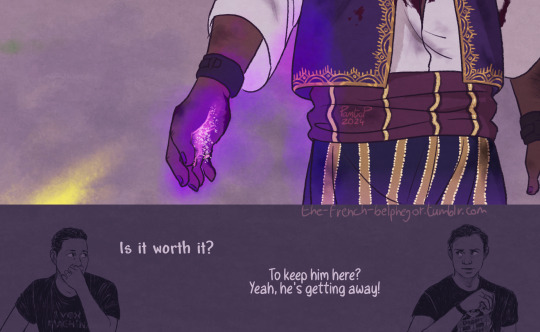
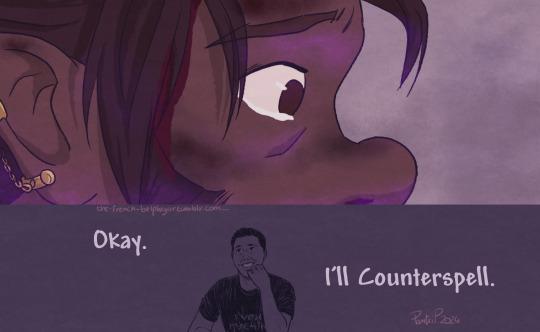
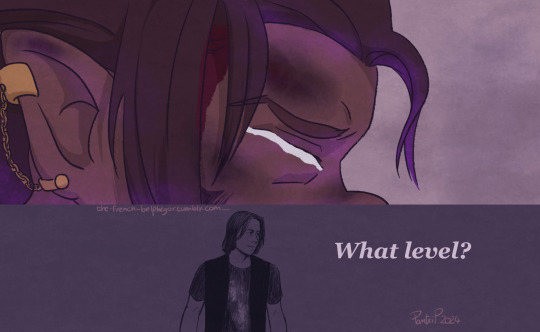
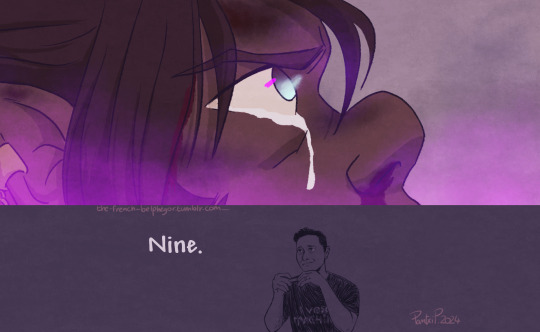
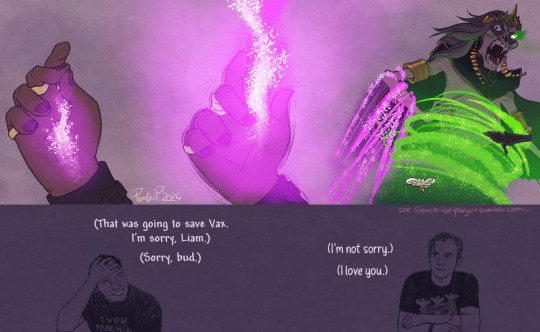
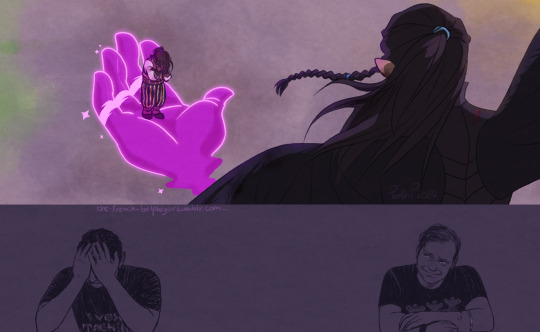
I finished my rewatch/relisten of the Vox Machina campaign in mid-December (although I recently re-embarked on the second half of the Chroma Conclave arc hoping season 3 of TLVOM will be announced (released?? 🤞) by the time I reach "A Bard's Lament"). Predictably, I bawled, AGAIN, but by then I'd already been scribbling and sketching ideas for this for... a couple of weeks? Hence the little WIP preview last month.
I'll never shut up about this moment. It's just as beautiful as it's heartbreaking, in- and off-game, especially taking into account all the context of characters/people involved.
Also, bonus, because after I finished sketching that 6th frame I thought a hug was needed.

"You broke my heart." and all of ours as well 💔
#critical role#vox machina#tlovm spoilers#vax'ildan#scanlan shorthalt#liam o'brien#sam riegel#matthew mercer#GIMP#fanart
7K notes
·
View notes
Text
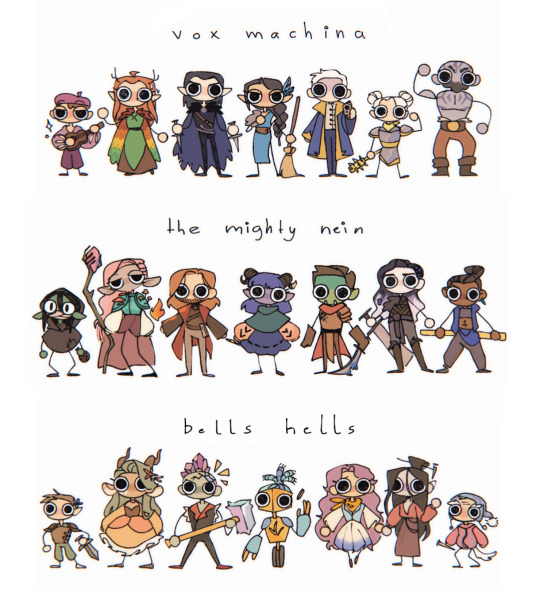
Felt a little silly for not posting them all together :']
#critical role#fanart#critical role art#critical role fanart#critrole#vox machina#the mighy nein#bells hells#skrungly#silly art#digital art#dnd#dungeons and dragons
6K notes
·
View notes
Text
Vox Machina episode 114 and Bells Hells episode 91.


Vax's death and FCGs death. History repeats itself
#critical role#vox machina#bells hells#liam o'brien#sam riegel#when sam couldn't save liam and liam couldn't save sam
4K notes
·
View notes
Text

They broke the world for each other.
This one was first published about a month ago on my Patreon. I tried to imagine what kind of portrait would Delilah and Sylas commission a painter to decorate Castle Whitestone have they defeated Vox Machina. I love how they weaponize their sexiness alongside their sheer lack of empathy for everyone but themselves and their evil god to obliterate their enemies. Relationship goals, really.
Sylas and Delilah Briarwood were created by Matthew Mercer and are property of Critical Role.
Available as a print on my InPrnt shop:
#critical role#criticalrole#critical role fanart#critrole#critical role art#dnd#the briarwoods#sylas briarwood#delilah briarwood#vox machina#keyleth of the air ashari#percy de rolo#vex'ahlia
4K notes
·
View notes
Text
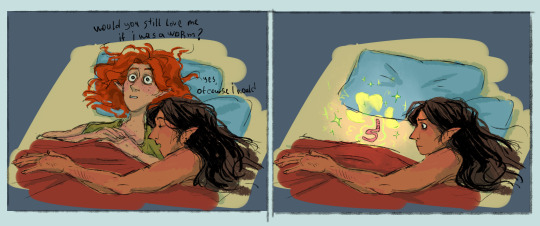
i had a vision
#critical role#vox machina#sketch#vax'ildan#keyleth of the air ashari#vaxleth#cr1#i have nothing to add#this stupid jike was sitting in my head for long enough
10K notes
·
View notes
Text
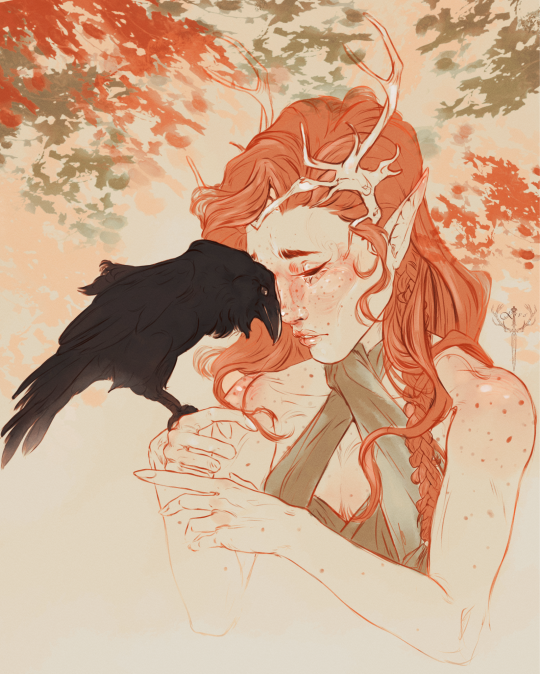
"I'll find you. I promise. I'll see you again."
#critical role#critical role vax#critical role keyleth#critical role fanart#vaxleth#vax'ildan#keyleth#vax x keyleth#art#drawing#fantasy#artist#digitalart#dnd#sketch#artists on tumblr#vox machina#the legend of vox machina
3K notes
·
View notes
Text

The Deathwalker’s Ward
I just had to paint him in his new armor 🥺🤲 but also this painting has changed me as a person it was so difficult 😭
#the legend of vox machina#tlovm#vaxildan#vax’ildan#critical role art#critical role fanart#critical role#vox machina#cr1#tlovm spoilers#the legend of vox machina spoilers#my art#artists on tumblr#illustration
14K notes
·
View notes
Text
The Legend of Vox Machina is a deeply philosophical show that asks important questions such as: “what if the Grand Duchess Anastasia Romanov had a gun?”
#this is about Percy btw#not art#critical role#vox machina#the legend of vox machina#tlovm#percy de rolo#percival fredrickstein von musel klossowski de rolo iii#critical role meme#cr meme#cr shitpost#cr1#anastasia
2K notes
·
View notes
Text

Just a Keyleth straight out of my comfort zone.
Did you happen to know that you can commission me? I'd love it if you commissioned me. Link in my bio.
#digital art#dnd#dnd 5e#illustration#critical role#critical role fanart#fanart#keyleth#vox machina#keyleth of the air ashari#cr1
2K notes
·
View notes
Text
Critical Role gets so much weirder when you remember that lines like “I wish for you in the future, to find someone who will mourn you when are gone” and “You were not born with venom in your veins” aren’t scripted, but lines like “Mother, I bring news from the womb” and “Meow. I’m a cat” are
#critical role#vox machina#the mighty nein#bells hells#sam riegel#matt mercer#travis willingham#marisha ray#liam o'brien#laura bailey#ashley johnson#taliesin jaffe
4K notes
·
View notes
Text





“𝑨𝒏𝒅 𝑰 𝒘𝒂𝒍𝒌 𝒂𝒘𝒂𝒚.”
yep it’s me back with more CR feels based on historical paintings 😅
This was actually requested by my partner for her birthday, and as she is the Keyleth to my Vax, how could I say no?
prints here! - my art tag
painted in procreate on ipad pro / do not repost / but reblogs are appreciated!
#my art#critical role#vaxleth#critical role fanart#critical role art#vaxildan#vax’ildan#keyleth#vox machina
2K notes
·
View notes
Photo

To those who passed through fire
For those who walked away
15K notes
·
View notes
Text
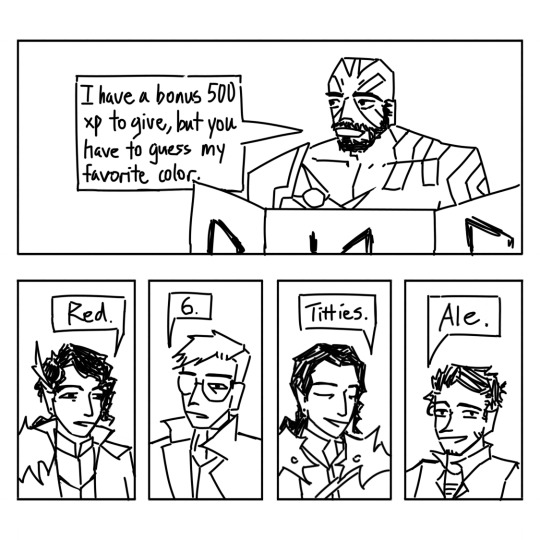
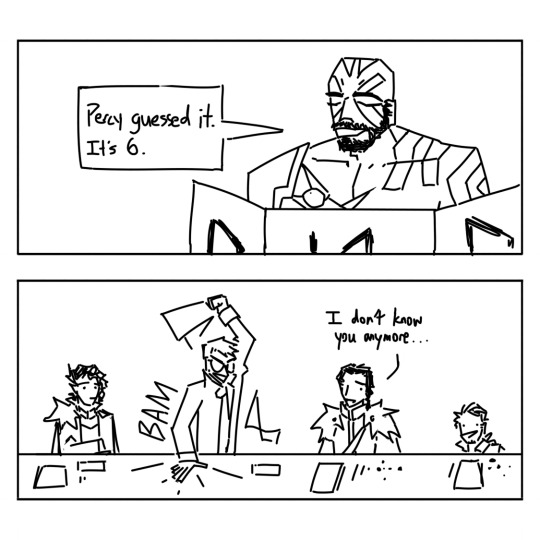
grog's favorite color (x)
#grog strongjaw#vex'ahlia#percy de rolo#vax'ildan#scanlan shorthalt#critical role#vox machina#the legend of vox machina#tlovm#cr#cr1#my art#mt#i finished everything but the last panel then proceeded to forget abt this for weeks </3#this is currently doing numbers ™ on twt which is wild to me. critrole twitter sure does love their artists huh <3
11K notes
·
View notes
Photo
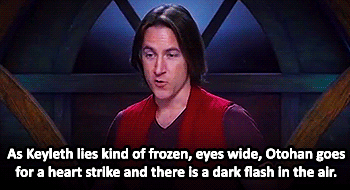


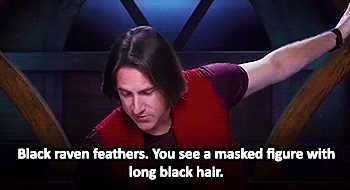
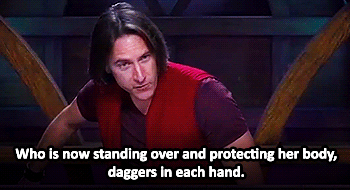


An Eleventh Hour Ally
#cr spoilers#critical role spoilers#critical role#criticalrolespoilers#critical role campaign 1 spoilers#cr1 spoilers#critical role campaign 3 spoilers#cr3 spoilers#critical role gifs#otterlyart gifs#bells hells#vox machina#OH MY GOD YOU GUYS OH MY GOD OH MY GOD#vax'ildan#keyleth of the air ashari#vaxleth
12K notes
·
View notes
Text
the reason critical role is so good is because every campaign features at least one cast member creating a character that they intend to be doomed by the narrative and matt and the rest of the cast going don’t be an idiot, Our Love Will Undoom Them. like in the explanation of percy’s final playlist, taliesin wrote, “Cheers to a happy ending for a character intended by his creator to be karmically irredeemable. May we all be so fortunate.” and just, Yeah.
#this is particularly about like. percy vax yasha caleb beau fcg imogen#also they’re jokes but like. tary as doomed as meant to just be a fucky joke and they were like no actually he’s my best friend#and bertrand being the Epitome of cast fuckery and . they’re the bell’s hells#the undooming nature of a found family’s love cannot be beat .#critical role#the mighty nein#vox machina#bell’s hells#percival de rolo#percy de rolo#taliesin jaffe#matthew mercer#matt mercer
11K notes
·
View notes